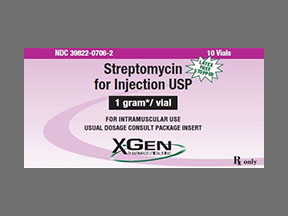
Streptomycin Coupons & Savings Card – Discount Prices from $545.80
Streptomycin is prescribed alongside other medications for the treatment of active tuberculosis (TB), particularly when other TB drugs are ineffective or when dealing with drug-resistant TB strains. As part of the aminoglycoside antibiotics class, Streptomycin eradicates the bacteria responsible for the infection. Additionally, it may be used to treat other severe infections, such as Mycobacterium avium complex (MAC), tularemia, endocarditis, and plague, in combination with other medications.
Our coupons are free to use. Before paying, show the pharmacist your Streptomycin savings card to get your free discount. Use our filters below to edit the prescription box to match your needs. The Streptomycin prices will update based on your prescription needs. Above our Streptomycin coupons, you can change your location to see pharmacy prices and costs in other areas. We're here to help you buy Streptomycin at the lowest price with our prescription discount card.
My prescription
Edit
1GM, Streptomycin (10 Solution Reconstituteds)
Select pharmacy

CVS
$545.80
COUPON PRICE
Walmart
$791.95
COUPON PRICE
Walgreens
$802.94
COUPON PRICE
Albertsons
$813.75
COUPON PRICEStreptomycin savings card
Show this card to your pharmacist
CVS
$545.80
BIN
ID
PCN
GRP
019876
LHE0249D5B
CHIPPO
LHX
Powered by
Streptomycin is prescribed alongside other medications for the treatment of active tuberculosis (TB), particularly when other TB drugs are ineffective or when dealing with drug-resistant TB strains. As part of the aminoglycoside antibiotics class, Streptomycin eradicates the bacteria responsible for the infection. Additionally, it may be used to treat other severe infections, such as Mycobacterium avium complex (MAC), tularemia, endocarditis, and plague, in combination with other medications.
Our coupons are free to use. Before paying, show the pharmacist your Streptomycin savings card to get your free discount. Use our filters below to edit the prescription box to match your needs. The Streptomycin prices will update based on your prescription needs. Above our Streptomycin coupons, you can change your location to see pharmacy prices and costs in other areas. We're here to help you buy Streptomycin at the lowest price with our prescription discount card.
Streptomycin dosage forms
Use our Streptomycin 1GM coupon with prices from $545.80 for 10 Solution Reconstituteds.
Dosage Quantity Price from Per unit 1GM 10 Solution Reconstituteds $545.80 $54.58
| Dosage | Quantity | Price from | Per unit |
|---|---|---|---|
| 1GM | 10 Solution Reconstituteds | $545.80 | $54.58 |
